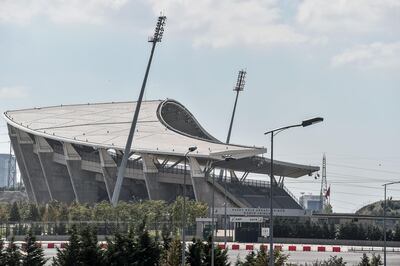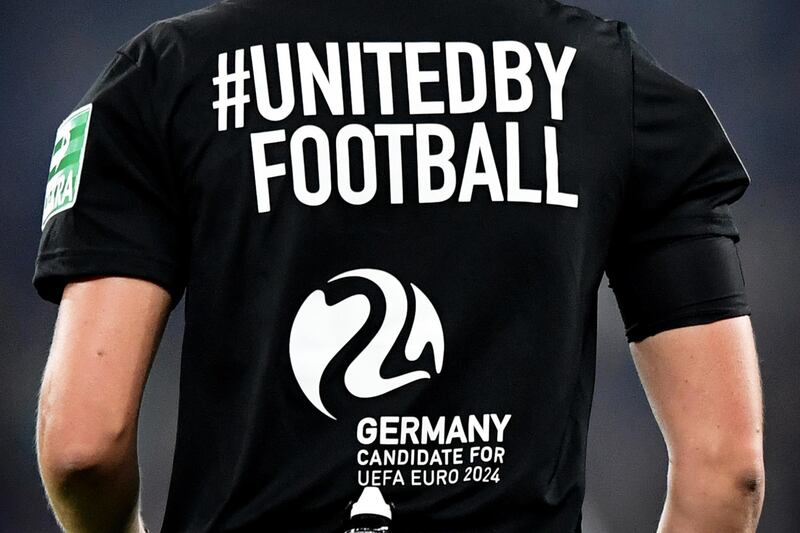Recep Tayyip Erdogan is scheduled to land in Berlin Thursday for a first state visit by the Turkish president to Germany for four years. Amid an expectation of vivid street protests, security will be conspicuous. His three-day visit is designed to thaw some of the tension between the two countries, but it will begin with host or guest obliged to extend congratulations on an important sporting contest.
In Switzerland, Uefa’s executive committee will earlier have voted on whom of Germany or Turkey stages the 2024 European Championship, football’s most financially valuable competition after the World Cup, and, in its expanded form with 24 finalists, a sustained summer show that focuses global attention on its host. Germany, favourites, will submit to Uefa’s decision-makers this morning arguments that emphasise the country’s infrastructure and modern facilities, peppered with reminders of the success of the 2006 World Cup, held in Germany and generally applauded.
The Turkey bid, the fourth attempt to host a Euros by a nation that has yet to be awarded the privilege, will stress the strong backing of Erdogan for the project and appeal to Uefa’s stated desire to expand its traditional spheres of influence. Of the last 10 editions of the tournament, nine were held in western Europe; Poland and Ukraine’s joint hosting in 2012 was a signpost towards newer frontiers, and the unorthodox arrangement to disperse the 2020 tournament across 12 centres, from Baku in Azerbaijan to Bucharest in Romania is another nod to that principle.
Turkey will present the case that hosting the tournament in nine of its cities, from Istanbul to Gaziantep, will benefit Uefa and the wider game, without compromising the bottom line. Money talks. Euro 2016, held in France, generated around €850 million for European football’s organising body; the French economy benefited by an estimated €1.2bn according to one academic study.

The Turkish bid, though, has to convince sceptics. Its overall stadium capacities are lower than Germany’s, and the projected ticket-prices cheaper, on average. Moreover, the decision by Uefa takes place after a difficult period for the Turkish economy, with a slump in the value of the lira following trade-tariff disputes with the United States. Human-rights organisations have also lobbied Uefa, whose evaluation report on the Turkish bid points to “the lack of an action plan in the area of human rights [as] a matter of concern.”
But the notion that Germany ticks all the right boxes is also easily challenged. At several Bundesliga matches last weekend, paraphenalia displayed by the German Football Association promoting the Euro 2024 bid - slogan: "United by Football, United in the Heart of Europe" - was answered by banners in the grandstands reading "United by Money, Corrupt in the Heart of Europe," symptoms of a groundswell of supporter opinion against the running of the sport in Germany.
This has not been a good year for German football. The national team crashed out of the World Cup - Turkey failed even to qualify - in the first round for the first time since 1938, and the campaign was overshadowed by the racially-charged controversy over Mesut Ozil and Ilkay Gundogan's May meeting in Britain with Erdogan. Both players, admired Germany internationals, have Turkish heritage but were criticised for endorsing Erdogan's regime by being photographed with the president. Their loyalty to Germany was also questioned, including by members of parliament. Ozil, a World Cup winner in 2014, has since announced he would no longer play for Germany, citing "racism and disrespect."
____________
Read more:
Andy Mitten: Roy Keane leads tributes for 'humble' Liam Miller as Manchester United Legends compete in Cork fundraiser
Steve Luckings: Stripping Pogba of vice captaincy feels like final straw in fractured relationship with Mourinho
Andy Mitten: Alexis Sanchez's form becoming a concern for Manchester United
Ian Oxborrow: As Alexis Sanchez struggles, here's 7 other big-name Manchester United flops
____________
The feelgood fame of Germany's 2006 World Cup has also been tarnished by revelations about the bidding process then. The German FA won the right to host that tournament narrowly, thanks to an abstention by a Fifa executive in the last round of voting that swung the decision away from South Africa. Following reports that the big organisers operated a slush fund to influence voting, the previous president of the German FA, Wolfgang Niersbach, a member of the 2006 bid committee, resigned.
Back in 2000, when Germany was awarded the 2006 showpiece, the country also promoted the event as a driver of national unity, a World Cup to bring together a nation that had, until 1990, been divided into East Germany and West Germany. The former East hosted five matches in Leipzig but otherwise concentrated the action in former West Germany.
The German bid privately believe they will have the votes of most of the western European members of the 18 Uefa executive committee members - the Turkish and German FA heads will not vote - and that their country’s readiness to host, without major construction in the next six years, will be their trump card. Whatever the outcome, both countries must then turn their attention, on the pitch, to having a team up to standard in six years time.






